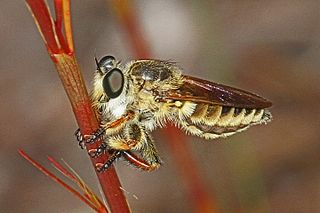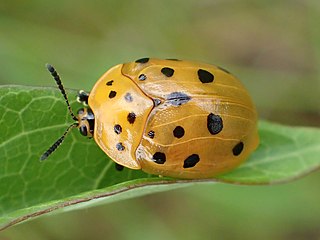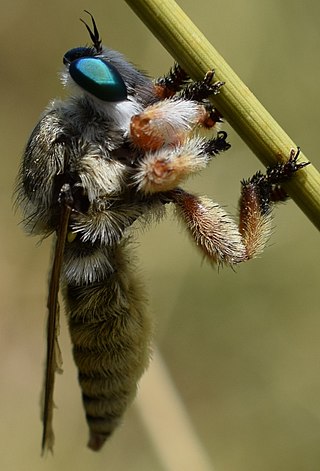
Spearmint, also known as garden mint, common mint, lamb mint and mackerel mint, is native to Europe and southern temperate Asia, extending from Ireland in the west to southern China in the east. It is naturalized in many other temperate parts of the world, including northern and southern Africa, North America, and South America. It is used as a flavouring in food and herbal teas. The aromatic oil, called oil of spearmint, is also used as a flavoring and sometimes as a scent.

Genus is a taxonomic rank above species and below family as used in the biological classification of living and fossil organisms as well as viruses. In binomial nomenclature, the genus name forms the first part of the binomial species name for each species within the genus.

Herring are various species of forage fish, mostly belonging to the family of Clupeidae.

Wildlife conservation refers to the practice of protecting wild species and their habitats in order to maintain healthy wildlife species or populations and to restore, protect or enhance natural ecosystems. Major threats to wildlife include habitat destruction, degradation, fragmentation, overexploitation, poaching, pollution, climate change, and the illegal wildlife trade. The IUCN estimates that 42,100 species of the ones assessed are at risk for extinction. Expanding to all existing species, a 2019 UN report on biodiversity put this estimate even higher at a million species. It is also being acknowledged that an increasing number of ecosystems on Earth containing endangered species are disappearing. To address these issues, there have been both national and international governmental efforts to preserve Earth's wildlife. Prominent conservation agreements include the 1973 Convention on International Trade in Endangered Species of Wild Fauna and Flora (CITES) and the 1992 Convention on Biological Diversity (CBD). There are also numerous nongovernmental organizations (NGO's) dedicated to conservation such as the Nature Conservancy, World Wildlife Fund, and Conservation International.

Enicocephalidae, also called unique-headed bugs and gnat bugs, are a family of around 300 species of the suborder Heteroptera. They are typically 4 mm (0.16 in) long, and found throughout the world. They have an elongated head, constricted in places, hence their head is 'unique'.

The Encyclopedia of Life (EOL) is a free, online encyclopedia intended to document all of the 1.9 million living species known to science. It aggregates content to form "pages" for every known species. Content is compiled from existing trusted databases which are curated by experts and it calls on the assistance of non-experts throughout the world. It includes video, sound, images, graphics, information on characteristics, as well as text. In addition, the Encyclopedia incorporates species-related content from the Biodiversity Heritage Library, which digitizes millions of pages of printed literature from the world's major natural history libraries. The BHL digital content is indexed with the names of organisms using taxonomic indexing software developed by the Global Names project. The EOL project was initially backed by a US$50 million funding commitment, led by the MacArthur Foundation and the Sloan Foundation, who provided US$20 million and US$5 million, respectively. The additional US$25 million came from five cornerstone institutions—the Field Museum, Harvard University, the Marine Biological Laboratory, the Missouri Botanical Garden, and the Smithsonian Institution. The project was initially led by Jim Edwards and the development team by David Patterson. Today, participating institutions and individual donors continue to support EOL through financial contributions.

Genetic pollution is a term for uncontrolled gene flow into wild populations. It is defined as "the dispersal of contaminated altered genes from genetically engineered organisms to natural organisms, esp. by cross-pollination", but has come to be used in some broader ways. It is related to the population genetics concept of gene flow, and genetic rescue, which is genetic material intentionally introduced to increase the fitness of a population. It is called genetic pollution when it negatively impacts the fitness of a population, such as through outbreeding depression and the introduction of unwanted phenotypes which can lead to extinction.
Elipsocidae is a family of Psocodea belonging to the infraorder Homilopsocidea. Members of the family have a free areola postica. Many species are apterous. The family includes about 130 species in more than 30 genera.

Kateretidae also known as short-winged flower beetles are a family of beetles in the superfamily Cucujoidea. There are 10 extant and 4 extinct genera, and at least 40 described species. They are found worldwide except in New Zealand. Adults are anthophagous, feeding on flowers, while the larvae are spermatophagous inside the flower corolla.

Salpingidae or narrow-waisted bark beetles is a family of beetles in the superfamily Tenebrionoidea. The species are small, about 1.5 – 7 mm in length. The family is globally distributed and consists of about 45 genera and 300 species, which are generally found in the temperate regions of both hemispheres. The family is mainly associated with plants as well as with ascomycete and hyphomycete fungi. Some members of the family are associated with unusual habitats, like Aegialites and Antarcticodomus, which are found in coastal areas including the intertidal zone, with former feeding on algae.

iNaturalist is an American 501(c)(3) nonprofit social network of naturalists, citizen scientists, and biologists built on the concept of mapping and sharing observations of biodiversity across the globe. iNaturalist may be accessed via its website or from its mobile applications. iNaturalist includes an automated species identification tool, and users further assist each other in identifying organisms from photographs and even sound recordings. As of 9 July 2024, iNaturalist users had contributed approximately 197,660,888 observations of plants, animals, fungi, and other organisms worldwide, and 290,007 users were active in the previous 30 days.

Megaphorus is a genus of robber flies in the family Asilidae. There are about 18 described species in Megaphorus.
Megaphorus willistoni is a species of robber flies in the family Asilidae.
Megaphorus megachile is a species of robber flies in the family Asilidae.
Megaphorus laphroides is a species of robber flies in the family Asilidae.

Chelymorpha cassidea, known generally as the Argus tortoise beetle or milkweed tortoise beetle, is a species of leaf beetle in the family Chrysomelidae. It is found in the Caribbean and North America.

Megaphorus acrus is a species of robber flies in the family Asilidae.
Megaphorus minutus is a species of robber flies in the family Asilidae.
Animal Ethics is a nonprofit organization formed to promote discussion and debate around issues in animal ethics and to provide information and resources for animal advocates. They also do outreach work in several countries on the issue of speciesism. Their aim is to create a world where moral consideration is extended to all sentient beings. The organization's website covers topics such as speciesism, sentience, veganism and wild animal suffering and has content translated into several languages.














